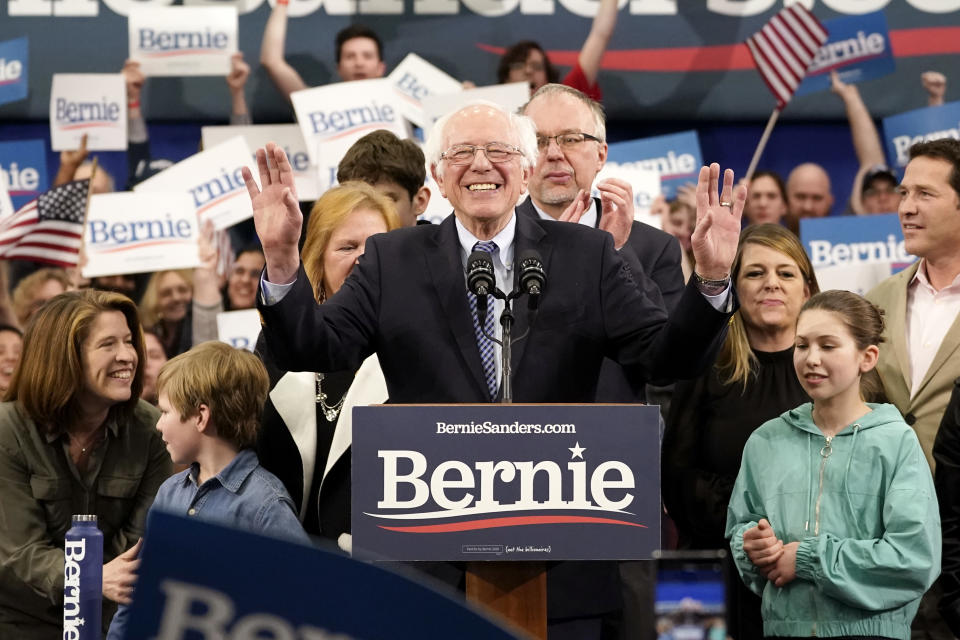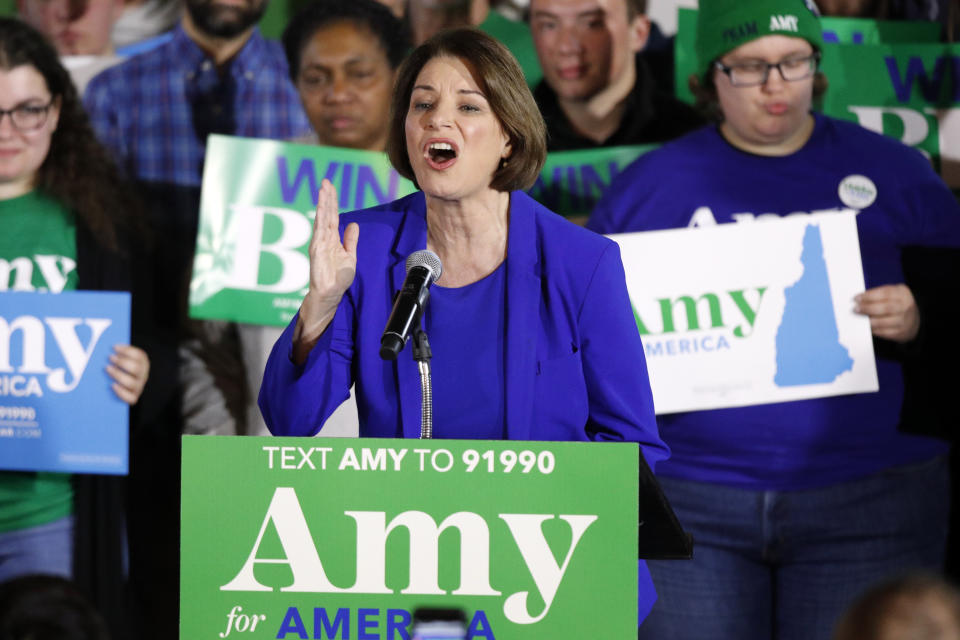Sanders narrowly wins New Hampshire primary, but Democratic race remains in flux
- Oops!Something went wrong.Please try again later.
- Oops!Something went wrong.Please try again later.
- Oops!Something went wrong.Please try again later.
- Oops!Something went wrong.Please try again later.
- Oops!Something went wrong.Please try again later.
Sen. Bernie Sanders pulled out a narrow victory in New Hampshire’s Democratic primary on Tuesday, the Associated Press projected, with two more moderate candidates, Pete Buttigieg and Amy Klobuchar, close on his heels.
With 90 percent of the vote counted, Sanders, the Vermont independent, was also declared the winner by CBS, CNN, ABC and NBC. He led Buttigieg, the former mayor of South Bend, Ind., by less than 2 percent of the vote. Klobuchar, the senator from Minnesota, came in third place.
In 2016, when the Democratic primary was was essentially a two-person race, Sanders cruised to victory over Hillary Clinton in New Hampshire by a margin of over 22 points, earning 60 percent of the vote.
“Let me say that this victory here is the beginning of the end for Donald Trump,” Sanders said in Manchester, prompting his supporters to chant “Bernie beats Trump!” in response.
Sanders asserted that he was two for two in the first contests of the Democratic primary.

“The reason that we won tonight in New Hampshire, that we won last week in Iowa, is because of the hard work of so many volunteers,” Sanders said.
When it comes to delegates awarded to the candidates on Tuesday, however, Sanders tied Buttigieg in New Hampshire with nine delegates apiece. Klobuchar earned six delegates.
Despite tensions between some of his supporters and Buttigieg’s, Sanders pledged that, whoever ended up as the nominee, “We are going to unite together and defeat the most dangerous president in the modern history of this country.”
A little more than a week after upsetting Sanders in the Iowa caucus delegate count, Buttigieg nearly pulled off a second improbable win in the Granite State.
“You asserted that famous independent streak,” Buttigieg told his supporters in a speech in Nashua, adding that the results showed that “We are here to stay.”
Congratulating Sanders on his “strong showing tonight,” Buttigieg stressed that his competitors for the Democratic nomination are “on the same team.”
Klobuchar used her speech Tuesday to try to introduce herself to Americans — especially those in the states with a more diverse electorate that are next to cast votes — who may have missed her strong debate performances.
“Hello, America, I’m Amy Klobuchar, and I will beat Donald Trump,” the senator said, telling New Hampshire residents,“because of you, we are taking this campaign to Nevada. We are going to South Carolina, and we are taking this message of unity to the country.”

The news was less encouraging for other candidates in the crowded field. After a disappointing eighth-place finish, businessman Andrew Yang, who ran on a pledge to institute a universal basic income, announced he was ending his long-shot bid for the White House.
“I will support whoever is the Democratic nominee,” Yang told his supporters.
Sen. Michael Bennet, D-Colo., also exited the race, after failing to register in the final standings.
Former Massachusetts Gov. Duval Patrick said he would make a decision on his campaign’s future on Wednesday.
New Hampshire’s 24 delegates are awarded proportionally, but a candidate must meet a 15 percent threshold of support in order to receive a share. In perhaps the biggest surprise of the night, two former frontrunners, Sen. Elizabeth Warren of Massachusetts, who finished in fourth place, and former Vice President Joe Biden, who came in fifth, each received less than 10 percent of the vote and will not earn any delegates there.
“The fight we’re in, the fight to save our democracy, is an uphill battle, but our campaign is built for the long haul, and we’re just getting started,” Warren said in a speech that came with just a third of the votes counted. Warren also decried the uptick in attacks between rival candidates in the Democratic field.
“We cannot afford to fall into factions,” she said.
In a letter sent Tuesday evening to her supporters, Warren’s campaign said she still has a “path to victory.”
Sensing that his prospects for a strong showing in New Hampshire had dimmed, Biden left the state Tuesday morning as voting got underway. He headed to South Carolina, where he is expected to do better in the Feb. 29 primary, thanks to his support among African-Americans.

“You have no idea how great it is to be back in South Carolina,” Biden said at a rally in Columbia, noting that the state’s electorate is made up of the “the most committed constituency of the Democratic Party, the African-American community.”
But after disappointing showings in Iowa and New Hampshire, Biden now faces a must-win contest in the Palmetto State. “It ain’t over, man, we’re just getting started,” he assured his supporters.
President Trump, as expected, won overwhelmingly in the GOP primary in New Hampshire, but with less than the "95 percent" approval among Republicans that he has boasted he can expect. Former Massachusetts Gov. William Weld got about 9 percent of the Republican vote, and together with minor candidates, reduced the president’s share to around 86 percent.
At a Monday night rally in Manchester, Trump encouraged his supporters to cast a vote for the “weakest candidate” in the Democratic field, to give him an easy opponent to beat in November. He didn’t say who that might be, but Republican Party officials in other states have reportedly been pushing for crossover votes for Sanders.
Under New Hampshire law, voters who have registered as “undeclared” can cast their vote in either party’s primary.
According to New Hampshire’s secretary of state, the state has 415,871 undeclared voters, more than those registered as either Democratic (276,385) or Republican (288,464).
_____
Read more from Yahoo News:
· Full coverage, FAQs & more: 2020 Election Center
· Treasury Department sent information on Hunter Biden to expanding GOP Senate inquiry
· Trump adds six new countries to travel ban list
· Romney and Trump have a long-running love-hate relationship




